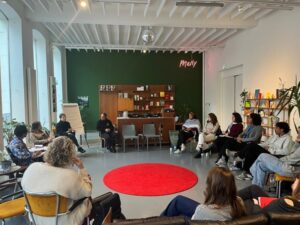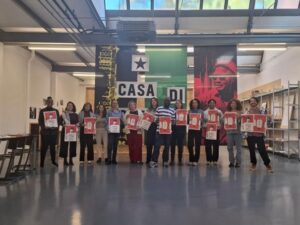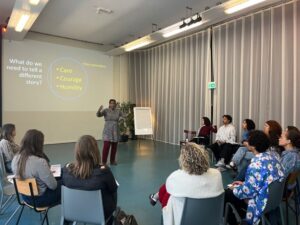
A somatic and interpersonal approach to Racial Justice
Racial justice and anti-racism are perhaps one of the most difficult, yet foundational topics discussed in international cooperation. Working on racial justice exposes all sorts of dynamics and systemic challenges around white saviorism, fragility, superiority, but also raises questions on allyship, solidarity and personal introspection. There is ample research and resources (below) emphasizing that this sector is not immune to systems and symptoms of racism. How to fix it? So where to start? How do we engage in these difficult conversations without running away, shutting down, perpetuating the cycle of inaction? This workshop flipped the script, starting at the personal, before moving into the practical, solution-oriented, organisational, managerial default mode. Throughout the day participants were invited to connect with their own embodied experience (somatics) of racism and interact with the experiences through a range of mindful methodologies.
Getting started
The workshop started with a heartfelt introduction. This set the tone of the session as we reflected on why we were gathered and recognized the diversity of participants present. This was followed by a grounding meditation session, involving mindful breathing exercises to help participants center themselves and become attuned to their presence.
Before you continue reading, you’re invited to use the same check-in questions and explore your intentionality on racial justice (and write it down):
- Why am I here? Why did I click on a blogpost, specifically dedicated workshop on racial justice?
- In one word, how does my body respond when I invite myself to reflect on this topic? How do I feel, and where do I feel it?
- Intentionality: How do I want to show up to others on this topic? How do I want to relate to others? What are my needs and limits for being present?
- Personal question: Write one question for yourself or others.
Insights from HipHopHuis and Melly
Representatives Aruna Vermeulen (HipHopHuis) and Vivian Ziherl (Melly) shared the mission and stories behind their organizations. They highlighted their roles in promoting racial justice, addressing barriers, and spreading powerful messages:
- Melly shared the story behind their name change from historical colonial figure ‘Witte de With’ to its present name, and its significance. What are you unnaming yourself of, and how do you represent a decolonial art institution?
- HipHopHuis emphasizes that anti-racism is part of their DNA; the concept of Hiphop is bringing justice by “default” as it centralizes marginalized and black & brown voices in societal narratives. Beyond and above anti-racism, Hiphophuis is a place of joy and celebration
“Anti-racism is part of our DNA, it is default, because through hiphop and culture we centre black and brown voices in society” Aruna Vermeulen, HipHopHuis

Casa di Cabral Exposition
The Exhibition ‘Casa di Cabral’ curated by The Black Archives & hosted by Hiphophuis, highlighted the decolonial liberation movement in Guinea Bissau and Cabo Verde. The story of Freedom fighter Amilcar Cabral helps us understand revolution and resistance in the current political realities of oppression. For example, the exhibition shares stories of international solidarity across independence movements across the African continent already in the 1960s and emphasizes music and culture as important instruments in creating post-colonial identities and supporting the movement of resistance.

Workshop with Dr. Aminata Cairo
This workshop was heartwarming and eye-opening about holding space for all types of stores. The workshop not only focused on listening, but also encouraged us to take a step further. It was a transformative experience that goes beyond surface-level understanding of diversity. The sessions encouraged participants to explore the deep connections that bind us all and to reflect on how we can create environments where each participant feels seen, valued and heard.
A key starting point, and powerful aspect of the workshop was the exploration of the dynamics between oppression and privilege. The discussions challenged us to think critically about how our actions uphold or dismantle inequities. Diversity is not just about variety- it’s about how we share space, take responsibility, and relate to one another meaningfully. Moreover, language also took a central role. Language demonstrates how the words we use shape our understanding of the world and who holds power within it. Dr. Cairo highlighted how cultural tendencies, like avoiding difficult conversations, can make it harder to confront systemic problems. Racism is one of those topics that is often avoided. Instead of avoiding discomfort, she encouraged participants to lean into it. Later during the workshop, Dr. Cairo guided the group through an unforgettable journey, teaching how to build trust and safety when sharing stories, because safe spaces don’t just appear; they require effort, awareness and a deep commitment to respect.

Consequently, Aminata Cairo Ph.D introduced three transformative perspectives: indigenous knowledge, the blues aesthetic, and Holy Hip Hop. From indigenous knowledge, we can learn about the interconnection of all living things and how wisdom can emerge when we remain open. The Blues Aesthetic encourages us to confront pain honestly. Crying out the blues, perseverance and embracing challenges as a pathway to healing and strength. Holy Hip Hop reminds us of the power of renewal. Our stories are not fixed; we can rewrite them and reclaim our narratives at any moment.
When tackling tough topics like racial justice, Dr. Cairo offered a refreshing perspective: rather than getting stuck in personal blame, we need to focus on transforming the space and the systems around us. We must delve deeper into the stories behind injustices, remain focused on what truly matters, and embody the values we want to see in the world. The workshop was a call to action: to support one another, trust in collective power, and never lose sight of the bigger picture. What made the experience even more powerful was the grounding practice of listening to our bodies and staying present, especially during emotionally intense moments. It is important to show care, courage, humility, and connection in every aspect of life.
Finaly, this workshop left us with a profound message: every story matters. It’s up to each of us to create spaces where those stories can be shared, rewritten, and celebrated.
“Will you honour my story? Just because you want my story doesn’t mean you’re entitled to it.” Aminata Cairo, Ph.D.
Our joint commitment – affinity groups
From February onward, Partos will start hosting affinity spaces to unpack and confront racial justice in our individual and organisational practices within international cooperation and offer spaces of reflection, collective care and activism. In collaboration with BRAP UK, these sessions will be guided by experienced racial justice facilitators, and will start in affinity groups for white and non-white people to ensure safety and collective care. The final aim to share a learning or action resource back to the community. Due to limited availability, the spaces are on a first come & first served basis and currently only available for Partos members and their partners. Send an email to gigi@partos.nl & aleida@partos.nl for more info.